| Listing 1 - 10 of 44 | << page >> |
Sort by
|
Book
ISBN: 0333116569 Year: 1974 Publisher: London
Abstract | Keywords | Export | Availability | Bookmark
 Loading...
Loading...Choose an application
- Reference Manager
- EndNote
- RefWorks (Direct export to RefWorks)
Berkeley, George --- Berkeley, George, --- G. B. --- B., G. --- Berkley, George, --- Author of The minute philosopher, --- Minute philosopher, Author of the, --- Cloyne, --- Berkeley, --- Member of the established church, --- בערקלי, דזשארדזש, --- Author of Siris,
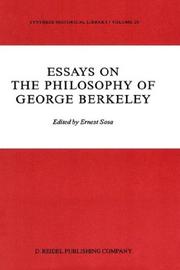
ISBN: 9027724059 9401086281 9400947984 Year: 1987 Volume: vol 29 Publisher: Dordrecht
Abstract | Keywords | Export | Availability | Bookmark
 Loading...
Loading...Choose an application
- Reference Manager
- EndNote
- RefWorks (Direct export to RefWorks)
Berkeley, George --- #GROL:SEMI-1-05'17' Berk --- Berkeley (George). --- G. B. --- B., G. --- Berkley, George, --- Author of The minute philosopher, --- Minute philosopher, Author of the, --- Cloyne, --- Berkeley, --- Member of the established church, --- בערקלי, דזשארדזש, --- Author of Siris,
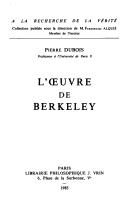
ISBN: 2711608816 9782711608812 Year: 1985 Volume: vol *10 Publisher: Paris Vrin
Abstract | Keywords | Export | Availability | Bookmark
 Loading...
Loading...Choose an application
- Reference Manager
- EndNote
- RefWorks (Direct export to RefWorks)
Berkeley, George, --- Berkeley, George --- Berkeley (George). --- G. B. --- B., G. --- Berkley, George, --- Author of The minute philosopher, --- Minute philosopher, Author of the, --- Cloyne, --- Berkeley, --- Member of the established church, --- בערקלי, דזשארדזש, --- Author of Siris, --- Berkeley, George, - 1685-1753
Book
ISBN: 0631130977 9780631130970 Year: 1982 Publisher: Oxford Blackwell
Abstract | Keywords | Export | Availability | Bookmark
 Loading...
Loading...Choose an application
- Reference Manager
- EndNote
- RefWorks (Direct export to RefWorks)
Berkeley, George, --- Berkeley, George --- G. B. --- B., G. --- Berkley, George, --- Author of The minute philosopher, --- Minute philosopher, Author of the, --- Cloyne, --- Berkeley, --- Member of the established church, --- בערקלי, דזשארדזש, --- Author of Siris, --- Berkeley, George, - 1685-1753
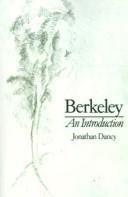
ISBN: 0631155090 9780631155096 Year: 1987 Publisher: Oxford Blackwell
Abstract | Keywords | Export | Availability | Bookmark
 Loading...
Loading...Choose an application
- Reference Manager
- EndNote
- RefWorks (Direct export to RefWorks)
Berkeley, George, --- Berkeley, George --- G. B. --- B., G. --- Berkley, George, --- Author of The minute philosopher, --- Minute philosopher, Author of the, --- Cloyne, --- Berkeley, --- Member of the established church, --- בערקלי, דזשארדזש, --- Author of Siris, --- Berkeley, George, - 1685-1753
Book
ISBN: 0192875477 0192875469 9780192875471 9780192875464 Year: 1982 Publisher: Oxford Oxford university press
Abstract | Keywords | Export | Availability | Bookmark
 Loading...
Loading...Choose an application
- Reference Manager
- EndNote
- RefWorks (Direct export to RefWorks)
Berkeley, George --- Berkeley, George, --- G. B. --- B., G. --- Berkley, George, --- Author of The minute philosopher, --- Minute philosopher, Author of the, --- Cloyne, --- Berkeley, --- Member of the established church, --- בערקלי, דזשארדזש, --- Author of Siris, --- Berkeley, George, - 1685-1753
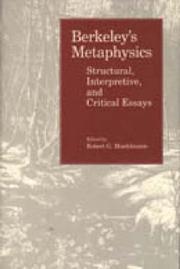
ISBN: 027101427X Year: 1995 Publisher: University Park (Pa.) : Pennsylvania state university press,
Abstract | Keywords | Export | Availability | Bookmark
 Loading...
Loading...Choose an application
- Reference Manager
- EndNote
- RefWorks (Direct export to RefWorks)
Metaphysics --- -God --- Ontology --- Philosophy --- Philosophy of mind --- History --- -Congresses --- Berkeley, George --- -History --- G. B. --- B., G. --- Berkley, George, --- Author of The minute philosopher, --- Minute philosopher, Author of the, --- Cloyne, --- Berkeley, --- Member of the established church, --- בערקלי, דזשארדזש, --- Author of Siris,
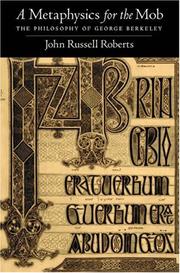
ISBN: 0195313933 9780195313932 0199871922 9786611163839 128116383X 0198042833 1435619951 Year: 2007 Publisher: Oxford Oxford university press
Abstract | Keywords | Export | Availability | Bookmark
 Loading...
Loading...Choose an application
- Reference Manager
- EndNote
- RefWorks (Direct export to RefWorks)
George Berkeley notoriously claimed that his immaterialist metaphysics was not only consistent with common sense but that it was also integral to its defense. Roberts argues that understanding the basic connection between Berkeley's philosophy and common sense requires that we develop a better understanding of the four principle components of Berkeley's positive metaphysics: The nature of being, the divine language thesis, the active/passive distinction, and the nature of spirits. Roberts begins by focusing on Berkeley's view of the nature of being. He elucidates Berkeley's view on Locke and the Cartesians and by examining Berkeley's views about related concepts such as unity and simplicity. From there he moves on to Berkeley's philosophy of language arguing that scrutiny of the famous "Introduction" to the Principles of Human Knowledge reveals that Berkeley identified the ideational theory of meaning and understanding as the root cause of some of the worst of man's intellectual errors, not "abstract ideas." Abstract ideas are, rather, the most debilitating symptom of this underlying ailment. In place of the ideational theory, Berkeley defends a rudimentary "use theory" of meaning. This understanding of Berkeley's approach to semantics is then applied to the divine language thesis and is shown to have important consequences for Berkeley's pragmatic approach to the ontology of natural objects and for his approach to our knowledge of, and relation to other minds, including God's. Turning next to Berkeley's much aligned account of spirits, the author defends the coherence of Berkeley's view of spirits by way of providing an interpretation of the active/passive distinction as marking a normative distinction and by focusing on the role that divine language plays in letting Berkeley identify the soul with the will. With these four principles of Berkeley's philosophy in hand, he then returns to the topic of common sense and offers a defense of Berkeley's philosophy
Metaphysics. --- Berkeley, George, --- Metaphysics --- God --- Ontology --- Philosophy --- Philosophy of mind --- Berkeley, George --- G. B. --- B., G. --- Berkley, George, --- Author of The minute philosopher, --- Minute philosopher, Author of the, --- Cloyne, --- Berkeley, --- Member of the established church, --- בערקלי, דזשארדזש, --- Author of Siris,
Book
ISBN: 9781443818551 Year: 2010 Publisher: Newcastle upon Tyne : Cambridge Scholars Publishing
Abstract | Keywords | Export | Availability | Bookmark
 Loading...
Loading...Choose an application
- Reference Manager
- EndNote
- RefWorks (Direct export to RefWorks)
Berkeley, George --- G. B. --- B., G. --- Berkley, George, --- Author of The minute philosopher, --- Minute philosopher, Author of the, --- Cloyne, --- Berkeley, --- Member of the established church, --- בערקלי, דזשארדזש, --- Author of Siris,

ISBN: 1280322772 0203413806 0203315529 9780203315521 9780203413807 9786610322770 6610322775 9780415063739 0415063736 9781134922925 1134922922 9781134922871 1134922876 9781134922918 1134922914 9781138473386 1138473383 0415063736 Year: 1993 Publisher: London New York Routledge
Abstract | Keywords | Export | Availability | Bookmark
 Loading...
Loading...Choose an application
- Reference Manager
- EndNote
- RefWorks (Direct export to RefWorks)
Alciphron, or the Minute Philosopher (1732) is Berkeley's main work of philosophical theology and a crucial source of his views on meaning and language. This edition contains the four most important dialogues and a selection of critical essays and commentaries reflecting the response of such writers as Hutcheson, Mill and Antony Flew. The only single edition currently in print, it argues that Alciphron has a more important place both in the Berkeley canon and in early modern philosophy than is generally thought.
Philosophy, Modern. --- Modern philosophy --- Berkeley, George, --- Berkeley, George --- G. B. --- B., G. --- Berkley, George, --- Author of The minute philosopher, --- Minute philosopher, Author of the, --- Cloyne, --- Berkeley, --- Member of the established church, --- בערקלי, דזשארדזש, --- Author of Siris,
| Listing 1 - 10 of 44 | << page >> |
Sort by
|

 Search
Search Feedback
Feedback About UniCat
About UniCat  Help
Help News
News